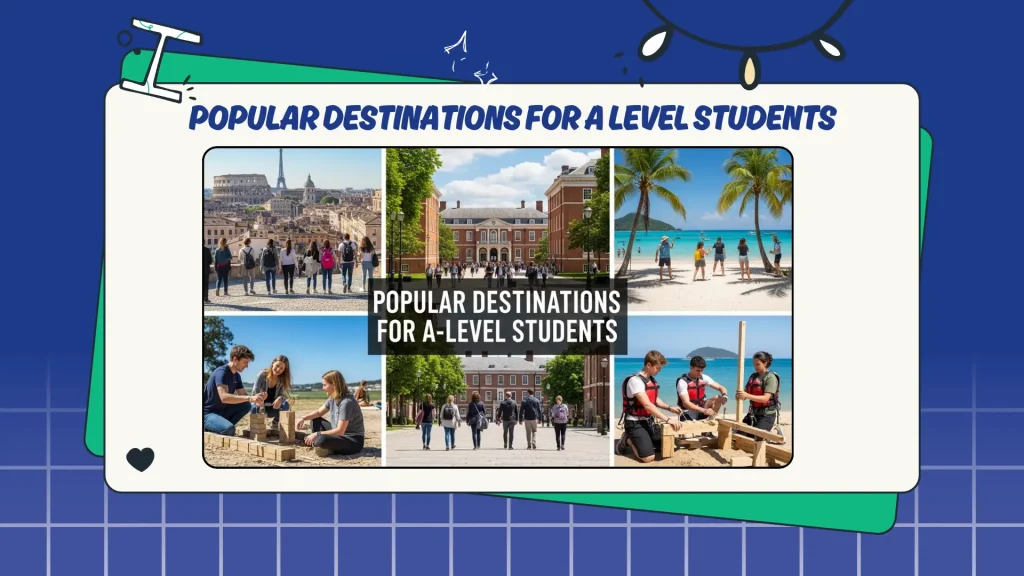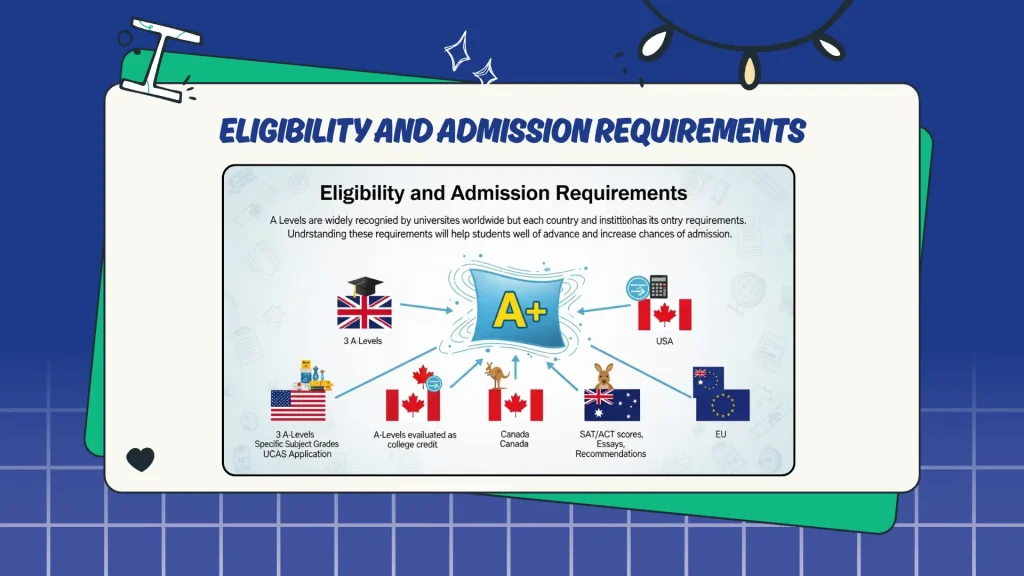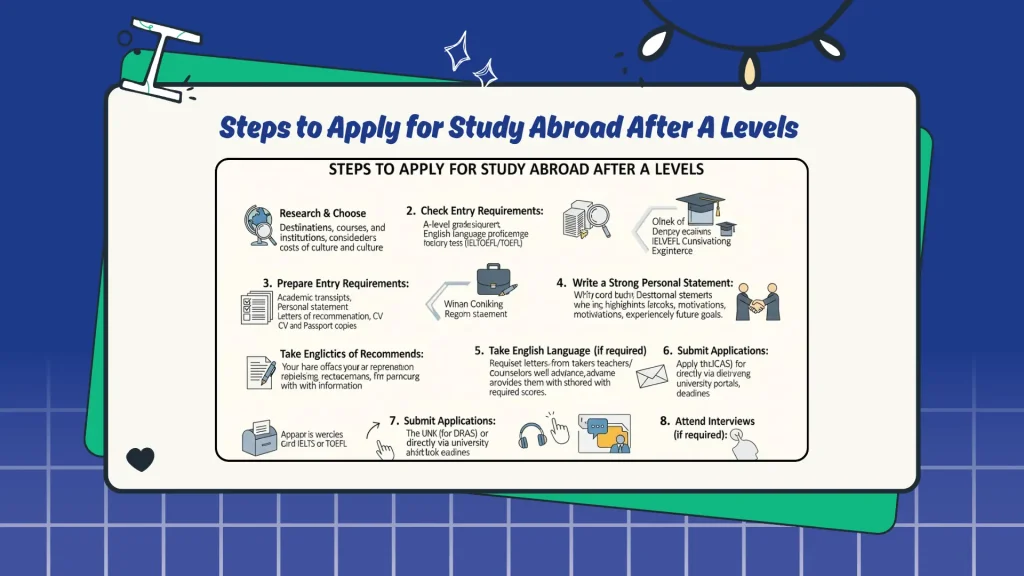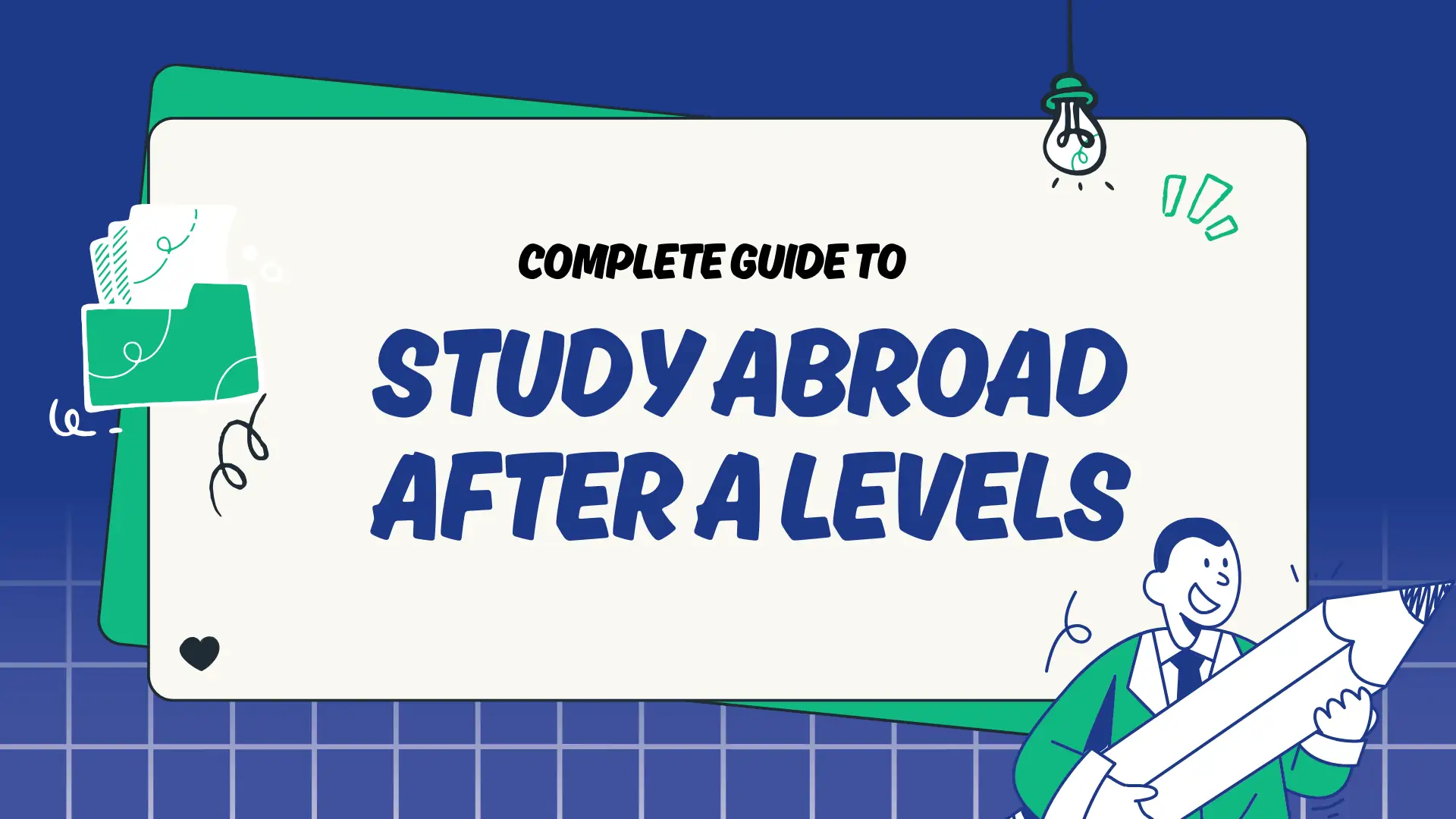Finishing your A Levels is not just the end of school, it’s the start of new opportunities that can shape your future. For many students, the next big step is studying abroad, where A Level qualifications open doors to some of the world’s most prestigious universities.
Whether you dream of attending Ivy League schools in the USA, top-ranked universities in the UK, research-focused institutions in Canada, or world-class campuses in Australia and Europe, your A Levels give you a strong academic foundation to pursue higher education internationally.
Studying abroad after A Levels offers far more than just an academic degree. It’s a chance to experience new cultures, global networking, and personal growth, while also gaining skills that make you stand out in today’s competitive job market.
However, this journey comes with important decisions, choosing the right country, understanding admission requirements, preparing financial plans, and applying for scholarships. Each destination has its own application process, tuition fees, and lifestyle differences, so being well-prepared is key.
In this article, we’ll cover everything you need to know about studying abroad after A Levels, from popular destinations and entry requirements to scholarships, career prospects, and tips for adjusting to life as an international student.
Whether you’re aiming for a specialized program, a globally recognized degree, or a life-changing experience, this article will help you make informed decisions about your future.A Levels are widely offered in many countries, including the UAE,
where top international schools provide high-quality education. If you’re exploring where to pursue O and A Levels before planning to study abroad, check out our detailed guides on O and A Level Schools in Dubai, O and A Level Schools in Abu Dhabi, and O and A Level Schools in Sharjah.
Why Study Abroad After A Levels?
Studying abroad after completing A Levels is a life-changing decision that offers both academic and personal benefits. Since A Levels are recognized worldwide as a rigorous and prestigious qualification.
They give students the flexibility to apply to leading universities across multiple countries. But beyond academic recognition, there are several compelling reasons why students choose to continue their education abroad:
1. Global Recognition of A Levels
A Levels are accepted by thousands of universities around the world, including institutions in the UK, USA, Canada, Australia, and Europe. This makes it easier for students to secure admissions into competitive degree programs.
2. Access to World-Class Education
Studying abroad opens doors to top-ranked universities and cutting-edge research facilities. Students gain access to diverse teaching methods, advanced technology, and global faculty expertise, preparing them for success in international careers.
3. Cultural Exposure and Personal Growth
Living in a different country provides a unique opportunity to experience new cultures, traditions, and languages. This not only builds independence and adaptability but also develops strong interpersonal and communication skills that are highly valued worldwide.
4. Better Career Opportunities
Graduates with international degrees often have a competitive edge in the job market. Employers value candidates who have studied abroad for their global perspective, problem-solving abilities, and adaptability in diverse workplaces.
5. Scholarships and Financial Aid Options
Many universities abroad offer scholarships and financial aid specifically for international students with strong A Level results. This makes it possible to pursue higher education without overwhelming financial stress.
6. Pathway to Permanent Residency
In countries like Canada and Australia, studying abroad can also serve as a pathway to permanent residency, offering long-term benefits beyond just academics.
7. Building a Global Network
Studying abroad allows students to connect with peers, professors, and professionals from different parts of the world. These Study Abroad connections can become valuable networks for future careers and collaborations.
Students from leading institutions such as O and A Level Schools in Ajman and O and A Level Schools in Umm Al Quwain often choose to continue their academic journey overseas, taking advantage of the global recognition of A Levels.
Popular Destinations for A Level Students

One of the biggest advantages of completing A Levels is that they are widely recognized across the globe, giving students the freedom to choose from a variety of study destinations.
Each country offers unique opportunities in terms of education quality, career prospects, and student experience. Below are some of the most popular destinations for A Level graduates:
1. United Kingdom (UK)
As the home of A Levels, the UK is the natural first choice for many students. Prestigious institutions like Oxford, Cambridge, Imperial College London, and the London School of Economics (LSE).
welcome A Level graduates directly into undergraduate programs. The UK also offers a wide range of specialized degrees, shorter course durations (usually 3 years), and strong career pathways.
Best for:
- Direct recognition of A Levels.
- World-class universities.
- Opportunities for scholarships such as Chevening and Commonwealth
2. United States of America (USA)
The USA is known for its flexible education system and vast choice of universities. Ivy League institutions and top research universities like Harvard, MIT, and Stanford accept A Level qualifications.
Unlike the UK, U.S. universities often encourage a broad-based education through liberal arts programs, allowing students to explore multiple subjects before choosing a major.
Highlights:
- Flexible study options with major/minor combinations.
- Strong focus on extracurricular activities.
- Abundant scholarships and financial aid for international students.
3. Canada
Canada has become a leading destination for A Level graduates thanks to its affordable tuition, multicultural environment, and clear immigration pathways.
Universities like the University of Toronto, McGill, and the University of British Columbia rank among the world’s best and welcome A Level results for direct entry.
Best for:
- Lower tuition fees compared to the USA and UK.
- Excellent post-study work visa options.
- Safe and welcoming environment for international students.
4. Australia
Australia is another top choice, with universities such as the University of Melbourne, Australian National University, and Study Abroad the University of Sydney offering strong academic programs.
A Level qualifications are directly accepted, and students benefit from world-class research opportunities, a relaxed lifestyle, and post-study work visas.
Best for:
- Direct entry into degree programs.
- Scholarships for international students.
- High employability and career opportunities after graduation.
5. Europe (Germany, Netherlands, France, etc.)
Many European countries are becoming increasingly popular for A Level graduates due to their affordable or even free tuition fees, high-quality education, and a wide range of English-taught programs.
Germany and the Netherlands, in particular, are attractive options for students seeking international exposure at a lower cost.
Best for:
- Low or no tuition fees at public universities.
- Strong academic and research-based programs.
- Rich cultural and travel opportunities within Europe.
With A Levels, students have the flexibility to apply to top universities across multiple continents, giving them a global advantage in shaping their academic and professional futures.
Eligibility and Admission Requirements

A Levels are widely recognized by universities worldwide, but each country and institution has its own set of entry requirements. Understanding these requirements will help students prepare well in advance and increase their chances of admission.
1. United Kingdom (UK)
- A Level Requirement: Most UK universities require 3 A Level subjects. Highly competitive universities (Oxford, Cambridge, Imperial, LSE) may expect A* or A grades in relevant subjects.
- Subject Relevance: Specific subjects are required for certain degrees (e.g., Medicine requires Biology and Chemistry).
- Additional Requirements: Some courses may require entrance exams like BMAT, UCAT, LNAT, or MAT and interviews.
English Proficiency: Usually covered if you studied A Levels in English, but IELTS/TOEFL may be needed in some cases.
2. United States of America (USA)
- A Level Requirement: A Levels are recognized, but U.S. universities often expect a broader profile. Students are assessed on grades plus extracurricular achievements.
- Standardized Tests: Some universities may ask for SAT or ACT scores, although many have become test-optional.
- Subject Relevance: Strong A Level grades in relevant subjects improve applications but flexibility is higher compared to the UK.
- English Proficiency: Non-native English speakers may need TOEFL or IELTS.
- Application System: Applications are usually submitted through the Common App.
3. Canada
- A Level Requirement: Canadian universities typically accept 3 A Level passes with good grades (A*–C).
- Subject Relevance: Certain programs require specific subjects (e.g., Engineering requires Math and Physics).
- Additional Requirements: Some programs (like Business or Arts) may require portfolios, essays, or interviews.
- English Proficiency: IELTS or TOEFL is usually required unless you studied A Levels in English.
4. Australia
- A Level Requirement: A Levels are accepted as direct entry to undergraduate programs. Universities usually Study Abroad look for at least 3 subjects with good grades.
- ATAR Equivalency: A Level grades are converted to an Australian Tertiary Admission Rank (ATAR) equivalent for admission.
- English Proficiency: IELTS, TOEFL, or PTE may be required for non-native speakers.
- Other Requirements: Some courses (like Medicine) may need additional entrance exams (e.g., UCAT ANZ) or interviews.
5. Europe
- Germany: Requires completion of A Levels with specific subject combinations. Some courses may require proficiency in German (TestDaF/DSH).
- Netherlands: Accepts A Levels for direct entry into bachelor’s programs, especially English-taught courses. Requires good grades in relevant subjects.
- France: Often requires A Levels plus French language proficiency for French-taught programs.
Other European Countries: Many accept A Levels for admission to English-taught programs, though requirements vary by country and university.
General Documents Required
No matter the country, most universities require the following:
- Completed application form.
- Academic transcripts (A Level and O Level/IGCSE results).
- Personal statement or essay.
- Letters of recommendation (from teachers).
- English proficiency test results (if required).
- Passport and identification documents.
With A Levels, students have a strong advantage in eligibility, but success also depends on early planning, choosing the right subjects, and meeting additional requirements such as entrance exams, language proficiency, or portfolios.
Scholarships and Financial Aid
Studying abroad can be a significant financial investment, but the good news is that A Level students have access to a wide range of scholarships and financial aid options.
Many universities and governments recognize the value of A Level qualifications and reward Study Abroad high-achieving international students with support programs. Here are some of the most common types:
- Merit-Based Scholarships: Awarded to students with strong A Level grades and outstanding academic performance.
- Need-Based Aid: Offered to students whose family income does not fully cover tuition and living expenses.
- Government and Institutional Grants: Provided by host-country governments or individual universities to encourage international enrollment.
- Special Scholarships for International Students: Countries such as the UK, Canada, and Australia offer exclusive scholarships to attract talented A Level graduates from around the world.
With careful research and strong applications, students can significantly reduce the cost of studying abroad, making international education more affordable and accessible.
Steps to Apply for Study Abroad After A Levels

Applying to study abroad after A Levels requires careful planning and organization. Following a structured approach will increase your chances of success and help you avoid last-minute stress. Here are the key steps every student should follow:
1. Research Universities
Start by deciding which country and course best suit your career goals. Shortlist universities based on academic ranking, tuition fees, available scholarships, and student life. Make sure the country you choose aligns with your long-term plans, such as post-study work opportunities.
2. Check Entry Requirements
Each university and program has specific subject and grade expectations. For example, Medicine may require Biology and Chemistry with top grades, while Engineering programs may ask for Mathematics and Physics. Review requirements carefully before applying.
3. Prepare Your Documents
Most universities require:
- Academic transcripts (O Levels/IGCSE and A Levels).
- Personal statement or essay explaining your goals.
- Letters of recommendation from teachers.
- A valid passport and identification documents.
Having these ready in advance saves time during the application process.
4. Take Required Tests
Many countries require additional standardized tests, such as:
- IELTS or TOEFL for English proficiency.
- SAT/ACT for U.S. universities.
UCAT, BMAT, or LNAT for specialized courses in the UK.
Make sure you register early and prepare thoroughly for these exams
5. Apply Early
University applications often have strict deadlines, especially for competitive programs. Applying early Study Abroad not only gives you more time to arrange visas and funding but also improves your chances of securing a place and scholarships.
6. Apply for Scholarships
Strong A Level results can help you win merit-based or need-based scholarships. Explore both university-funded and government-funded opportunities to reduce financial costs.
7. Plan Visa and Accommodation
Once you receive an offer, begin your visa application and look for student housing as early as possible. Securing accommodation close to campus makes your transition smoother and stress-free.
By following these steps, A Level students can move from planning to acceptance with confidence, ensuring a smooth start to their study abroad journey.
Conclusion:
Studying abroad after A Levels is one of the most rewarding decisions a student can make. With globally recognized qualifications, A Level graduates have a clear advantage when applying to top universities in the UK, USA, Canada, Australia, and beyond.
While the journey may seem challenging, navigating entry requirements, preparing documents, securing scholarships, and adjusting to a new environment, it is also a life-changing opportunity that opens doors to world-class education, cultural exchange, and international career prospects.
Whether you’ve studied at one of the best O and A Level Schools in the UAE or abroad, A Levels open doors to universities worldwide. Start preparing today and take your first step towards a brighter future.By planning early, researching the right universities, and taking advantage of available scholarships and financial aid, students can make their dream of studying abroad a reality.
Whether your goal is to pursue medicine, engineering, business, law, or any other field, A Levels serve as a solid foundation for academic and professional success.
In the end, studying abroad is not just about earning a degree, it’s about building confidence, gaining independence, and developing a global perspective that will shape Study Abroad your future. If you’re an A Level student, start preparing today, the world is waiting for you!
FAQs:
Can I apply abroad directly after completing my A Levels?
Yes, you can. A Levels are globally recognized qualifications that universities in countries like the UK, USA, Canada, Australia, and many parts of Europe accept. Once you complete your A Levels, you are considered ready for undergraduate admission abroad. However, the specific requirements may vary from one institution to another. Some universities may ask for standardized tests like SAT (for the USA) or additional entrance exams depending on the course
What grades do I need to study abroad?
Your required grades depend heavily on the ranking and reputation of the university. Top-tier institutions such as Oxford, Cambridge, Harvard, or MIT usually require outstanding grades (A* and A). Mid-level universities may accept students with a mix of B and C grades. It’s also important to match your subject choices with your intended field—for example, strong grades in sciences for medicine or engineering, and Study Abroad high grades in humanities for law or social sciences.
Do I need to take IELTS or TOEFL if I already studied in English?
In many cases, yes. Even if you studied A Levels in English, universities often require proof of English proficiency. Some universities may waive IELTS/TOEFL if your previous school was English-medium, or if you scored well in English at A Levels. Always check the entry requirements of your target university.
Which countries are best for A Level students?
The United Kingdom is the most natural fit, as A Levels are part of the UK’s education system. Australia, Canada, and the USA are also highly popular because they recognize A Levels easily and offer diverse courses. Countries like Germany, Singapore, and Malaysia are attractive options too, especially for Study Abroad affordable or specialized programs. The choice depends on your career goals, budget, and preferred lifestyle.
How many universities should I apply to?
It’s smart to apply to 4–8 universities. Choose:
Ambitious universities (harder to get into, higher requirements).
Match universities (where your grades fit well).
Safe universities (where you are confident of getting admission).
This strategy increases your chances of securing at least one offer, while also giving you flexibility in choosing the best option later.
What documents are required for applying abroad?
Commonly required documents include:
Official transcripts and predicted grades from your A Level school.
Personal statement or motivation essay explaining why you want to study that course.
Letters of recommendation from teachers.
Proof of English proficiency (IELTS/TOEFL, unless waived).
Passport copy and sometimes proof of financial ability.
Some universities may also require an academic portfolio (for art/design courses) or additional entrance test scores.
Can I get a scholarship with A Levels?
Yes. A Level students with excellent grades often qualify for merit-based scholarships. Universities and governments also Study Abroad provide need-based financial aid depending on your family’s income. Many countries, such as the UK, Canada, and Australia, offer special scholarships for international students, making studying abroad more affordable. Always apply for scholarships early, as competition is high.
Do A Level subjects affect my university course choice?
Absolutely. Your A Level subject combination can directly impact what courses you are eligible for. For example:
Medicine: Biology and Chemistry (sometimes Physics or Maths).
Engineering: Mathematics and Physics.
Business/Accounting: Mathematics or Economics preferred.
Law: No strict requirements, but English, History, or Politics are helpful.
Choosing the right subjects during A Levels ensures you meet university entry requirements for your dream degree.
How early should I start applying?
It’s best to start at least 12–18 months before your intended intake. For example, if you want to start university in September 2026, you should begin researching universities in early 2025. Applications, scholarship deadlines, and visa processing take time, so planning early prevents stress and missed opportunities.
Is it difficult to adjust to studying abroad?
It can be a big change, but most international students adapt within a few months. Universities abroad usually offer orientation weeks, student clubs, mentorship programs, and counseling services to support new students. You’ll meet peers from all over the world, and living independently teaches you valuable life skills. With time, you’ll enjoy the cultural exchange, freedom, and global opportunities.









Leave a comment